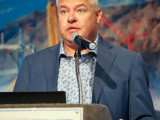We’re going to build a power plant that’s going to clean up carbon and take power plants carbon negative.
Boilermakers and guests met in Plymouth, Massachusetts, July 18-20, for the Northeast Area Tripartite, cautiously celebrating a temporary pause in Pennsylvania’s Regional Greenhouse Gas Initiative and looking toward the future with innovative ways to build carbon-negative power plants. In addition, attendees heard updates on the M.O.R.E. Work Investment Fund, Welding Boot Camp, Apprenticeship and Northeast-specific government affairs.
“It’s been several long, hard years so I’m happy to be back,” said IVP-NE John Fultz as he welcomed the group.
Fultz is also a trustee for the Boilermaker National Funds and said that in 2022, the Funds “hit the green zone, and that’s due to pension plan changes. And we certified green three years in advance. It’s good news for now.”
Guest speaker Dr. Evan Blumer from Consul Energy is traveling around the country getting the word out on alternative energy solutions using pressurized, fluidized beds which will produce a net zero to net negative combustion system.
“We’re going to build a power plant that’s going to clean up carbon and take power plants carbon negative,” Blumer said.
He stressed that the new generation of power plants need to have the ability to ramp up and down quickly to meet energy demands, be modular and cost effective. Consul Energy is building such a plant through the U.S. Department of Energy’s 21st Century Power Plant Program, a multi-phase program that will lead to development of the power plant of the future that provides power-grid reliability and resilience with near-zero emissions and includes carbon capture, use and storage technology.
The project has already advanced through phases one and two of the DOE’s competitive process, conceptual design and pre-feed, and was recently selected for the third stage (design, development and feed) funding.
A pressurized fluidized bed has greater than 40% efficiency and several other advantages. It allows for fuel flexibility, combustion efficiency and low emissions. Its design improves total plant efficiency and utilizes lower BTU and wet fuels.
“The CO2 we capture is a critical part of this project,” Blumer said. “The most valuable thing this plant will do is not producing energy but capturing CO2. There’s a massive system that needs to be built (across the U.S.). You can’t decarbonize steel, manufacturing, hydrogen unless you have a place to store CO2.”
International Director of Climate Change Policy Solutions Cory Channon talked about removing the rhetoric and fear from the discussion of mitigating climate change.
“There’s a lot of fear that’s being spread out there and there doesn’t need to be. We have solutions to the climate crisis,” he said. “Every country will take its own path to reduce greenhouse gas emissions. Rather than divest, we need to invest. We need to build up larger alliances.”
Channon said that advocacy is critical. “We have to educate people. We have a lot of work to do to convince politicians. There’s a lot of funding and research going on out there. It’s going to take time,” he said. “We don’t have the infrastructure for the electric vehicle market. These are the types of things we need to pay attention to.”
He said the narrative that’s been created suggests the world is going to burn up overnight. But there are solutions. “We need to push realistic narratives.”
In a small win supporting realistic narratives, the Regional Greenhouse Gas Initiative, in effect in 11 states, is now on hold in Pennsylvania, thanks in part to the Boilermakers and their activism. In Pennsylvania, Boilermakers and other unions and utilities filed suit against the Pennsylvania Department of Environmental Protection. These groups have been instrumental in fighting against the system of carbon credits, which are proven to shut down jobs without significantly lowering emissions. Director of Government Affairs Cecile Conroy discussed RGGI at length.
“The good news is that on July 8, a preliminary injunction was granted to prevent RGGI’s implementation,” she said. “The Commonwealth is expected to appeal the decision to the Pennsylvania Supreme Court.”
Conroy gave updates on other political news including the need to pass the PRO Act. She said that the infrastructure bill, passed late last year, is good news for the union as the bill includes $1.2 trillion in spending on traditional infrastructure such as roads, bridges, etc. plus other new programs including significant funding for the Department of Energy for demonstration projects such as CCUS, direct air capture, nuclear, hydrogen and other clean technologies.
In other news, Executive Director of Construction Sector Operations Tim Simmons gave a detailed account of jobs created and money going into members’ pockets through work obtained through the M.O.R.E. Work Investment Fund. The program has produced excellent results for the union across all sectors as well as in the Northeast where 67,546 man-hours have been gained through the M.O.R.E. Work program.
“The Northeast has taken ownership of this fund,” Simmons said. “It’s apparent in what’s been done. These are not just numbers on paper. You’re putting people to work that would not have otherwise worked.”
Director of National Training Services Jeff Hughes gave an update on Welding Boot Camp. He said 2,000 welders have graduated from Boot Camp with 200 in the Northeast. Contractors are seeing the benefit of the program and are coming to the boot camp to test welders. He encouraged business managers to contact him if they have a large project or turnaround coming up.
“We need to talk about it. In the spring we had 84 manpower requests,” he said. “If you have upcoming manpower needs, we can help. We can set up extra camps. We can get journeymen up to speed. As an organization, we need to communicate. We’re a team. If one suffers, we all suffer.”
BNAP Coordinator Mark Wertz and NEAAC Administrator Jason Dupuis discussed various training for union members, including Boot Camp, the National Instructor Conference and EPRI training.
“We’re really ramping up the EPRI training,” Wertz said, noting the number of people going through EPRI needs to increase. “And that’s possible since all the locals have the certification to teach.”
“Every one of our apprentices is enrolled in EPRI torquing,” Dupuis said. “There’s no reason at all why we can’t get all of our apprentices and journeymen in it.”
Wertz discussed Skills USA and his desire to see lodges enter apprentices into the competition to garner Boilermaker exposure.
“My understanding is that every local can compete and be a part of Skills USA,” Wertz said. “Our goal is to get membership in Skills USA and get every local to enroll in team competition for apprentices where we would compete against colleges.”









